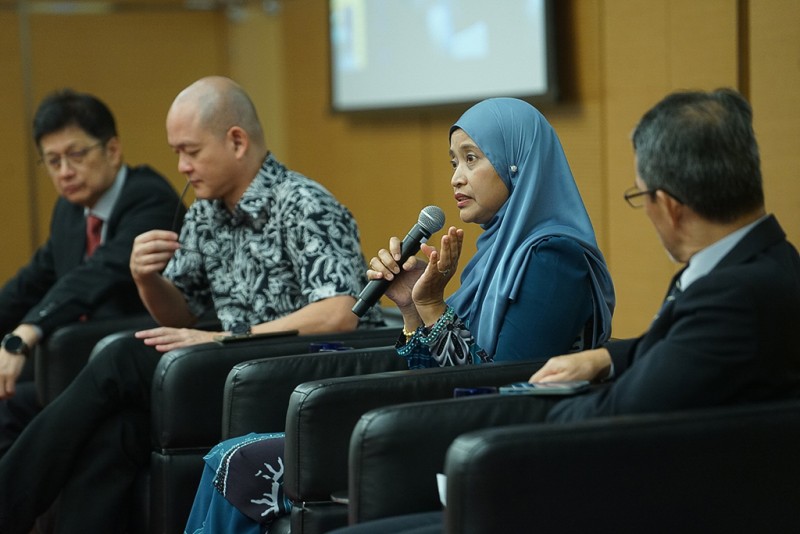
AMID the pandemic’s challenges, Malaysia emerges as a country with notable resilience and potential for recovery, leading the way among five other surveyed countries, according to the World Bank Group’s report.
Launched in Kuala Lumpur last week (Aug 3), the report examined the economic consequences and government responses to the Covid-19 pandemic in six East Asian economies: Malaysia, Vietnam, Cambodia, Indonesia, Mongolia and the Philippines.
“During Covid-19, our economy contracted 5.5% in 2020. Admittedly it was bad, but most importantly, for every crisis, we (government) learn something and as we always say, every bump has a silver lining. We must move forward, thinking what needs to be done,” Ministry of Finance (MoF) undersecretary Dr Mastura Abdul Karim told a panel discussion on the report.
The report noted that economic stability and growth were tested, consequently, the country’s economy was stable and growing pre-pandemic, with a 5% annual growth rate.
Mastura, who is from the ministry’s fiscal and economics division, also said thanks to the pandemic, Malaysia had to move into digital transition.
“The SME (small and medium enterprise) communities and all the businesses have learned that it’s so important to have digital transformation, digital adoption,” said SME Association of Malaysia national secretary general Chin Chee Seong.
Even though a lot of firms embraced technologies to adapt, the asymmetric nature of the shock and capacity to respond had the potential to widen inequality at the time of the crisis and in the future.
As such, this relates to one of the key findings in the report which was that the Covid-19 shock reduced employment and household income, noting that employment shocks were more severe for micro firms and family businesses.
“Our survey found that about two-thirds of low-income households and those that experienced economic shocks, self-assessed themselves are still having inadequate financial resources to cover their basic needs,” said World Bank senior economist Ririn Purnamasari in her presentation.
Further indicating that this finding is a “red-flag” on top of the insufficient level of access and receive, Ririn said the affected households were more likely to adopt negative coping mechanisms such as significantly reducing their food consumption or resorting to selling their prized items or any similar practices.
She added that these practices would have long-term implications for their welfare and their wellbeing, subsequently this situation will further widen socio economic inequalities that were already in place, even before the pandemic.
Despite progress, the nation still faces challenges in reducing poverty and inequality, with the Gini index remaining relatively high for an aspiring high-income country. The Gini index is a measure of statistical dispersion intended to represent the income inequality, the wealth inequality within a nation or a social group.
The World Bank also reported that the impact of the pandemic has been uneven, showing that micro firms and firms in sectors more sensitive to mobility restrictions (hospitality, construction, education services) are more affected.
Whereas, young, less-educated, informal workers and lower-income workers or households were more likely to have been negatively affected.
On the bright side, Malaysia has deployed a relatively large government assistance package, with wide coverage and a diverse mix of instruments for firms and households. Moreover, most households received some form of government assistance, with greater support during end-2021, slightly narrowing toward mid-2022.
Although nearly 80% of low-income households (monthly earnings of RM2,000 and below) received government assistance, about a quarter of them did not have access to cash transfers. On the other hand, more than one third of households earning more than RM10,000 received them, thus exposing gaps and levels.
Taylor’s University philosophy, politics and economics director Dr Ong Kian Ming suggested that the government could have a gradual adjustment mechanism, in dealing with government assistance or subsidy matters.
“Do it gradually, so that everyone knows of the government’s intention, announcing it beforehand. As an example, when it reaches a stage where the government needs to reduce the subsidy by 50%, then the government also needs to share with the ‘rakyat’ what happens to the other half,” he explained, saying the other half could be channelled to enhance social protection, for instance.
These savings could be channelled towards assisting the vulnerable community, development spending to expand the country’s future growth potential and reduce fiscal deficit to strengthen the fiscal position.
Ranked highest among the six countries studied according to the World Economic Forum’s Global Competitiveness Index, Malaysian firms were able to effectively navigate disruptions caused by the pandemic and capitalise on opportunities during the recovery.
At the same time, it was noted on the importance to enhance its labour market policies and expand coverage for informal workers. Malaysia’s labour programmes are relatively underdeveloped, with limited accessibility for workers in the informal sector.
Hence, Mastura said the integration of programmes across ministries and agencies and increased shock responsiveness can strengthen labour market policies.
“Hiring incentives should be balanced with well-designed training programs to address skills mismatches,” she said, emphasising that the Finance Ministry is amid developing a Central Database Hub (Padu).
Expected to be ready in Jan 2024, Padu aims to combine more socio-economic information to arrive at household net disposable income metric, instead of mainly relying on narrow identification of bottom 40% (B40), middle 40% (M40) and top 20% (T20) household income.
Continually evaluating and improving policies and investments in data-driven decision-making will be vital in effectively navigating future challenges and ensuring a more resilient and inclusive labour market.
Hence, moving forward, governments should prioritise equitable recovery, leveraging technological advancements, and strengthening social safety nets to protect vulnerable groups.
Source: https://themalaysianreserve.com/2023/08/08/malaysia-leads-regional-covid-19-recovery/

